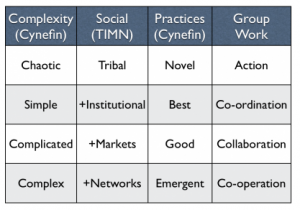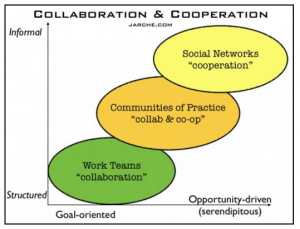Recently, several people have written, and referred to, articles regarding collaboration and its benefits and drawbacks. Some examples are:
- Collaborative Overload, by Rob Cross and Reb Rebele via Harvard Business Review
- 27 Facts and 11 Conclusions About Collaboration, by Oscar Berg
- Collaboration overload, by Martin White
Physical and online meetings seem to be the key to making business nowadays. But too many people attend too many meetings, not getting any “real” work done. There is simply no room or time left for private thoughts on how to advance the business. And a few percent of the staff are collaboration heroes, attending nearly all meetings, but burning out. Something must change, but is there a better way?
Maybe Harold Jarche is on to a solution. See for example “In networks, cooperation trumps collaboration“, he combines the Cynefin and TIMN frameworks and applies it to working:

So, while we have evolved from the Chaotic level up to the Complicated level, many have stopped there. In such cases, the companies are still on this level:
“The market form, the third form of organization to take hold, enables people to excel at openly competitive, free, and fair economic exchanges.” (Materials for Two Theories: TIMN and STA-C by David Ronfeldt – thanks Harold Jarche for the link).
The next step, the Complex stage, is here described as: “The network form, the fourth to mature, serves to connect dispersed groups and individuals so that they may coordinate and act conjointly.” By then, we have also moved from Collaboration to Cooperation. Harold Jarche also explains this in one of his models:

This means that we should focus less only on simply working together in structured and goal-oriented scenarios – collaborating. It is based on old ways of working and forming companies. Yes, we need it and can fine-tune it with Collaboration Managers, but it is not the final stop on the bus ride: Probably, we need to learn how to cooperate via informal and opportunity-driven scenarios, and thereby create more humane digital workplaces. Less two-hour meetings with no agenda. More sharing freely in networks, without expecting others to return your favors. As Harold Jarche says, cooperation makes us human.
How do we create this cooperation in our companies? I have no clear answer yet, but I have seen enough meeting fatigue in too many colleagues over the years. The tools and methods we use at work must now reflect the more open and spontaneous mindset of cooperation. I will explore this further in my own work, and look forward to hearing from others.

One thought on “Too much collaboration? Try some cooperation.”